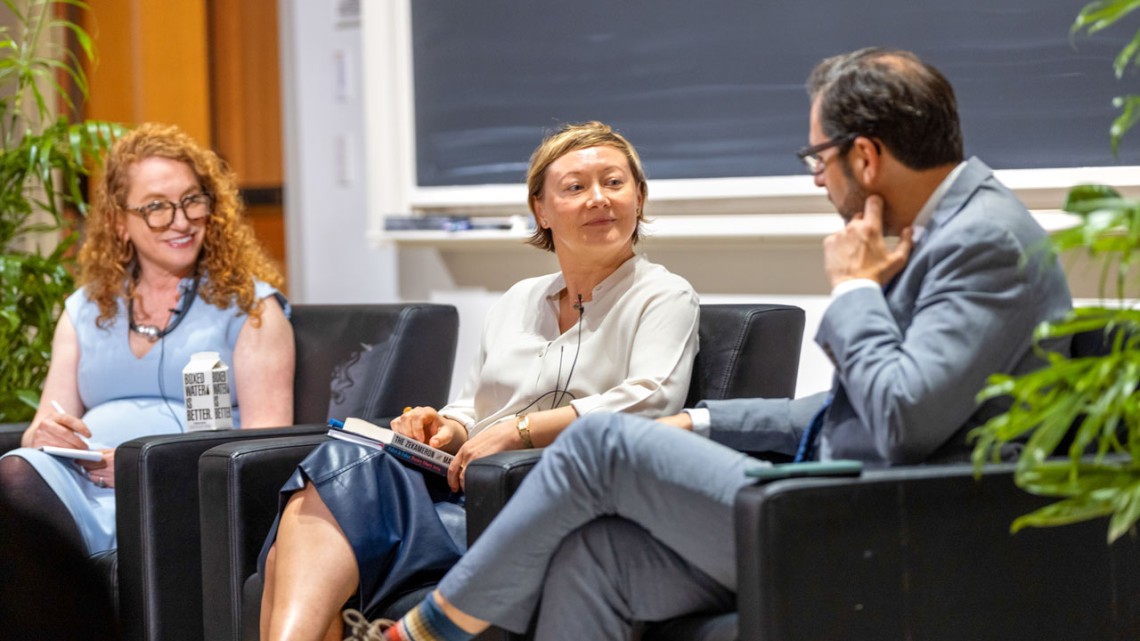
Valzhyna Mort, center, discusses the risks writers take to speak out in many countries, with Suzanne Nossel, left, and David Folkenflik ’91.
Paying a price to speak out, dissident writers help preserve freedoms
By Kate Blackwood
Narges Mohammedi, a journalist and women’s rights activist, smuggled her Nobel Peace Prize speech out of an Iranian jail so her 15-year-old twins, whom she has not seen for 10 years, could give it for her.
Suzanne Nossel, CEO of PEN America, a nonprofit whose goal is to raise awareness for the protection of free expression, was at the December 2023 award ceremony in Oslo to witness it.
“To contemplate the sacrifice Mohammedi has made of her family in order to carry out her work and sustain her voice and suffer through repeated stays in prison, you realize there is something extraordinary inside this person,” Nossel said during “Dissident Writers: A Conversation” on April 17. “We need people in our world who are willing to undertake that and carry that burden for us.”
By taking risks to criticize governments or societies in environments where there is a cost, dissident writers like Mohammedi keep freedoms open for others, Nossel said during the event, sponsored by the College of Arts and Science (A&S) and moderated by David Folkenflik ’91, NPR media correspondent.
Folkenflik said he feels fortunate that his year as the A&S Zubrow Distinguished Visiting Journalist at Cornell has “fallen during a year when the thematic thread tying things together is the question of freedom of expression – the implications and the importance, the costs of it, and what it does for society at large.” (Read a Q&A with Folkenflik here.)
The discussion continued these themes and was split into two parts – the first livestreamed by eCornell, the second in-person only and joined by poet Valzhyna Mort, associate professor of literatures in English (A&S).
Mort has written widely about the political dissent in Belarus, both in her poetry and in news outlets such as The New York Times and the BBC.
“That work opened a lot of doors for me to wonderful, large central newspapers and broadcast, but that work also closed a very important door and that’s a door back home,” she said. “That was the price for that work, my inability to return home for fear of arrest.”
Writers in the U.S., where the First Amendment provides strong protections for speech compared to other parts of the world, sometimes face book-banning, cancellation and online threats, Nossel said, but it has to be put in context with writers around the world. In many places, writers face threats to “their livelihood, their families, their safety, their very freedom as a cost of speaking their mind.”
“To me, freedom of expression is the right that underpins all other rights,” Nossel said. “You can’t campaign for women’s rights or environmental justice or immigrants’ rights or racial justice if your free expression rights are not protected.”
Nossel and Folkenflik discussed China and Russia, Iran and Turkey – countries with long records of repressing dissent. Focusing on Russia, Nossel pointed out that Russian writers have been exiled and independent media outlets shut down while foreign journalists enter the country at their peril, pulling a dark curtain down on large parts of the world at the center of current events.
This month, PEN America will publish its annual census of writers in prison worldwide, an indicator of threats to writers around the world, not only in the expected places but in surprising ones, too. Nossel said that Hungary, Poland and India, among others, have hampered writers critical of current regimes.
“China and Russia are big players on the geopolitical scene, but it’s very important to look at what happens in small countries, like Belarus,” said Mort, an award-winning poet who was born in Belarus and has family living there. “Because isolated, in the dark, invisible, they become underreported laboratories of torture and deprivation.”
Mort writes creatively and journalistically about Belarus, as well as supporting the work of writers in the country. She feels it is her responsibility as a writer to express what is happening under the authoritarian regime of President Alexander Lukashenko. People are arrested for reading foreign media outlets or for liking certain social media posts. Anyone, including college faculty, can have their computers checked by authorities for subscriptions, photos or correspondence that might be deemed extremist, Mort said.
Even so, writers get the truth out. Maxim Znak, a friend of Mort’s jailed for political dissent, has devised a method of “writing” in his head while in solitary confinement, where he’s not allowed paper or pen, before somehow getting the words down. He’s smuggled one manuscript out of the country that way; “Zekameron: One Hundred Tales From Behind Bars and Eyelashes,” was published by Scotland Street Press in 2023, won the English PEN Award and has been shortlisted for the 2024 Republic of Consciousness Prize.
Folkenflik wondered if there are success stories among dissident writers. Some become leading political figures, Nossel said, but for most it’s important just to keep their names alive and their work circulating.
“We hear so powerfully from dissidents who are freed or have contact outside the prison,” she said, “what it means to know that people are speaking about them, that their names are not forgotten, that people are reading their book.”
Humor gives Mort hope. “Our peace Nobel Laureate [Belarusian writer Ales Bialiatski, one of the winners of the 2022 Nobel Peace Prize] is in jail currently. He says jail is the only time he has time to write, jail is his writing residency. There is a lot of humor that comes out of horror.”
Kate Blackwood is a writer for the College of Arts and Sciences.
Media Contact
Abby Kozlowski
Get Cornell news delivered right to your inbox.
Subscribe
